 Last updated: April 22nd, 2024
Last updated: April 22nd, 2024
Solved - Why Is My AC Making Loud Sounds & How To Fix It?
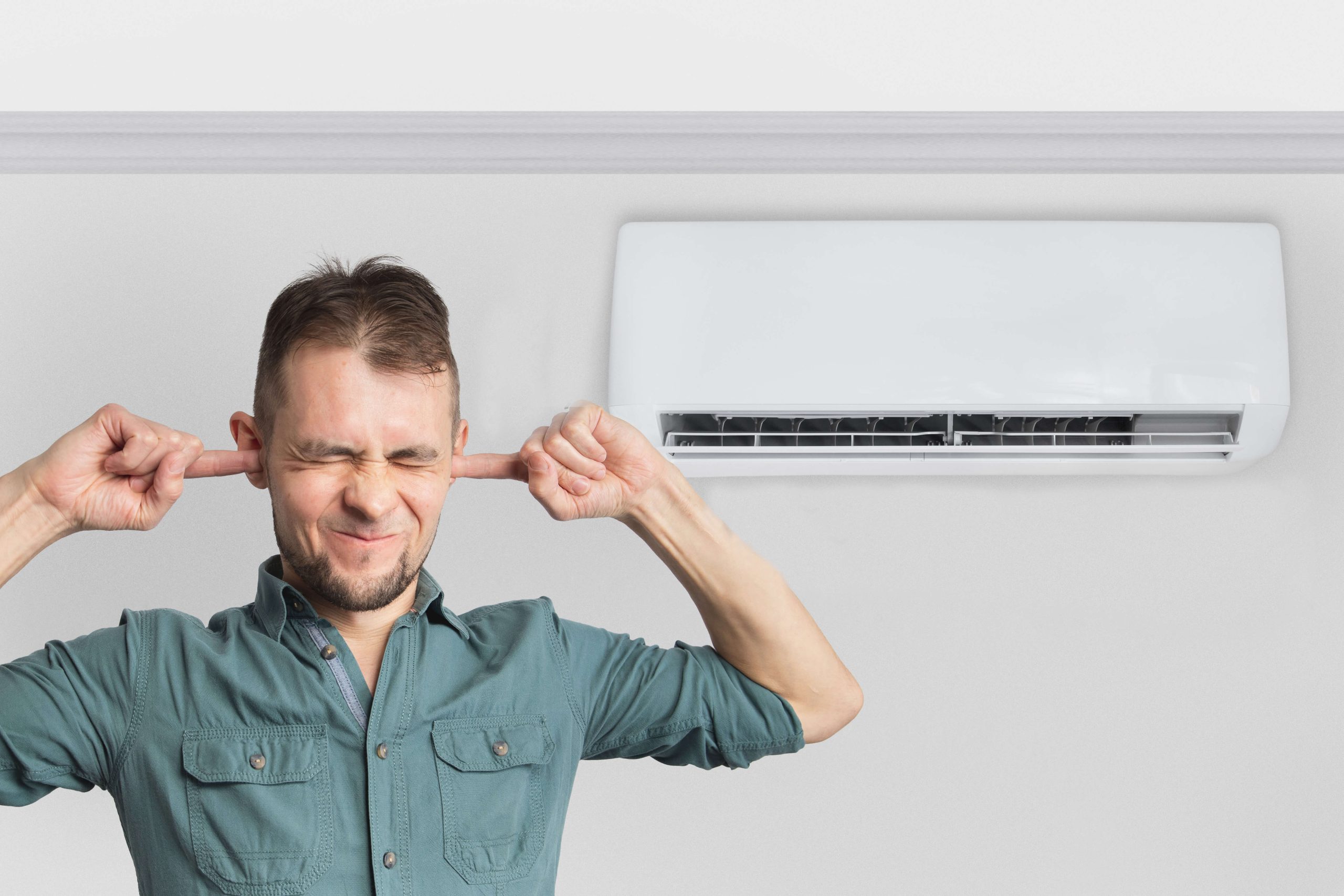
Ever feel like your AC is auditioning for a percussion band with its latest noisy performance? A sudden increase in noise from your air conditioner can be alarming and disruptive, especially during the sweltering summer months. Those loud noises can disrupt your peace and signal underlying issues affecting your comfort and energy efficiency.
However, understanding the possible causes of these loud sounds and ways to address them can help restore peace and comfort to your home. In this article, we’ll find answers to “Why is my AC so loud?” and provide practical solutions to resolve them.
Understanding Common Causes of AC Noise & DIY Solutions
Common causes of AC noise can vary, but some of the most frequent culprits include the following:
1. Faulty Fan Motor
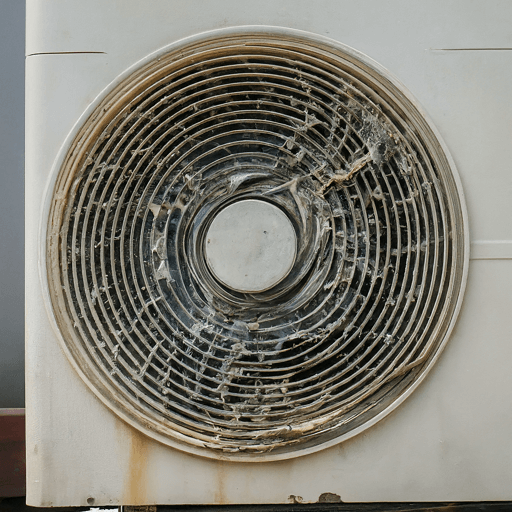
Cause: A faulty fan motor can result in loud humming, buzzing, or grinding noises from the air conditioner. This can occur due to wear and tear, electrical issues, or motor bearings becoming worn out over time.
Effects: A malfunctioning fan motor can lead to decreased airflow and inefficient cooling, as well as potential damage to other components of the AC system if left unaddressed.
DIY Solution
- Safety First: Before attempting any repairs, ensure that the power to the AC unit is turned off at the circuit breaker to prevent electrical accidents.
- Inspect the Fan Motor: Begin by visually inspecting the fan motor for any signs of damage, such as frayed wires, corrosion, or overheating.
- Clean the Fan Motor: Use a soft brush or cloth to gently clean any dirt, dust, or debris accumulated on the fan motor. This can help improve airflow and prevent further damage.
- Check Electrical Connections: Ensure all electrical connections to the fan motor are secure and tight. Loose connections can cause electrical arcing and contribute to noise issues.
- Lubricate the Motor Bearings: If the fan motor bearings are accessible, lubricate them using a few drops of lightweight machine oil. This can help reduce friction and minimize noise.
- Replace the Fan Motor: If the fan motor is severely damaged or beyond repair, it may need to be replaced. Consult the manufacturer’s instructions or seek professional assistance for proper installation.
2. Damaged or Worn Fan Blades
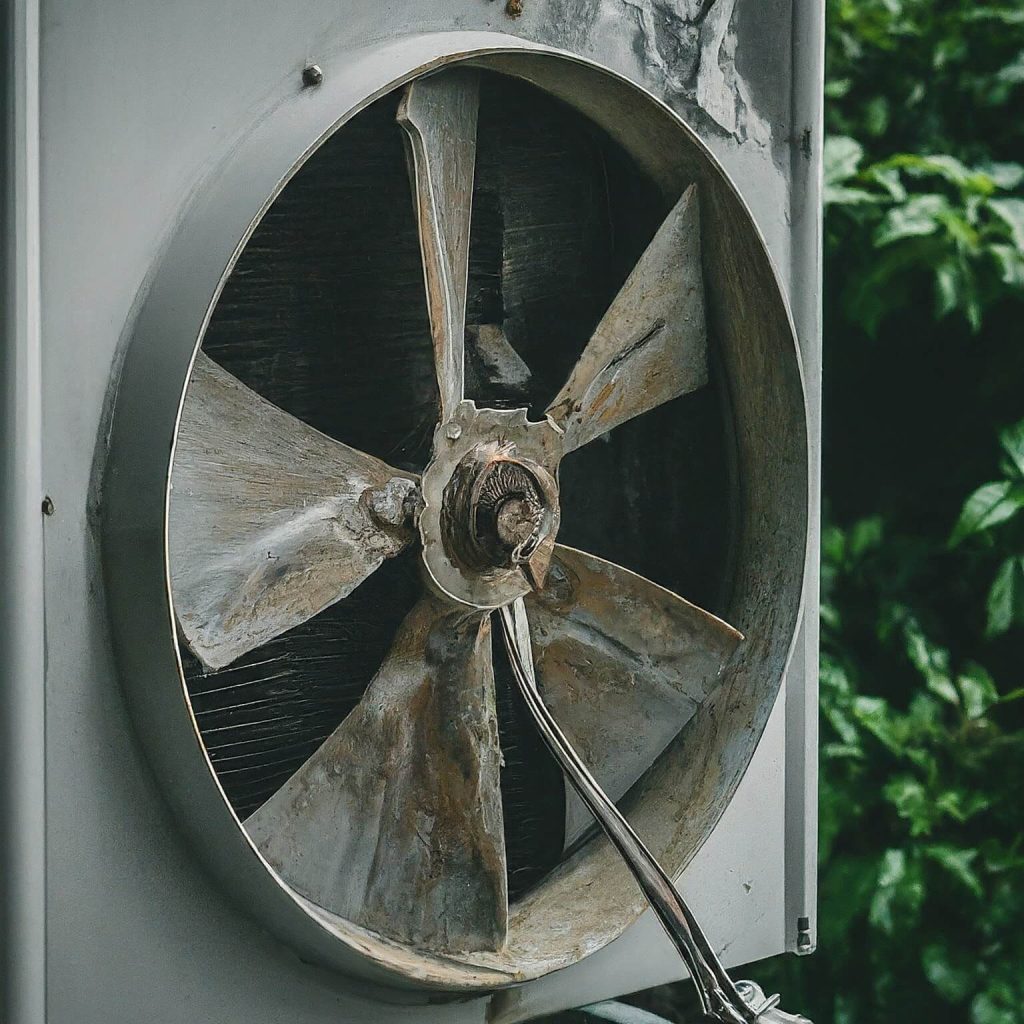
Cause: Damaged or worn fan blades can produce loud rattling, scraping, or banging noises when operating the AC unit. This can occur due to debris buildup, physical damage, or excessive wear.
Effects: Damaged or worn fan blades can impair airflow and cause imbalance in the fan system, leading to increased noise levels and reduced cooling efficiency.
DIY Solution
- Inspect the Fan Blades: Carefully inspect the fan blades for any signs of damage, such as cracks, chips, or bends. Pay attention to both the leading and trailing edges of the blades.
- Clean the Fan Blades: Use a soft brush or cloth to remove any dirt, dust, or debris that may be accumulated on the fan blades. This can help improve airflow and reduce noise.
- Straighten Bent Blades: If any of the fan blades are bent or misaligned, carefully straighten them using gentle pressure. Avoid applying excessive force, as this can further damage the blades.
- Tighten Loose Blades: Ensure all fan blades are securely fastened to the motor shaft. Tighten any loose screws or bolts using the appropriate tools.
- Replace Damaged Blades: If the fan blades are severely damaged or cannot be repaired, they may need to be replaced. Consult the manufacturer’s instructions or seek professional assistance for proper replacement.
3. Refrigerant Leaks
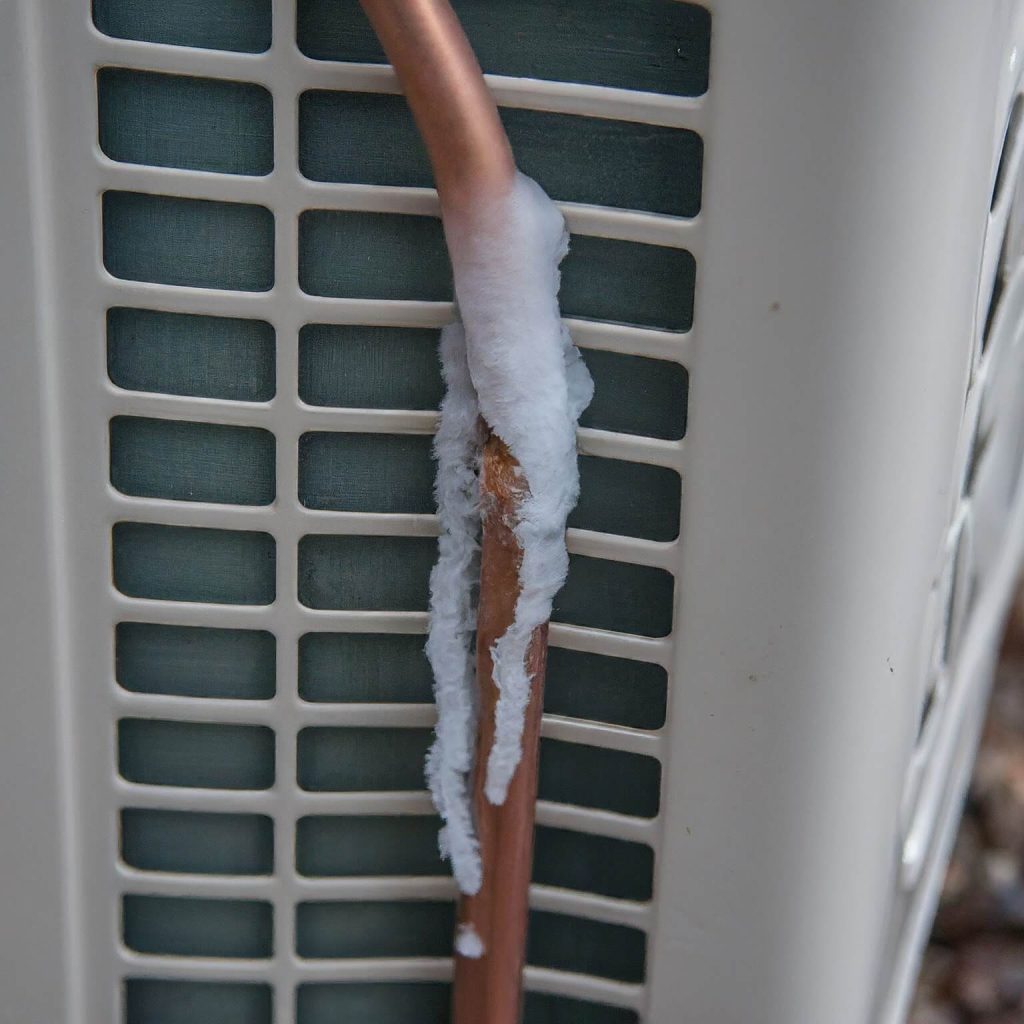
Cause: Refrigerant leaks can occur due to corrosion, physical damage, or faulty installation of components within the AC system. When refrigerant leaks occur, refrigerant is gradually lost from the system, leading to hissing or bubbling noises as the refrigerant escapes.
Effects: Refrigerant leaks contribute to noisy operation, reduce the AC unit’s cooling capacity, and increase energy consumption. Continued operation with a refrigerant leak can also lead to compressor failure and other costly repairs.
DIY Solution
- Detect the Leak: Use a refrigerant leak detector or soap solution to locate the source of the refrigerant leak. Focus on areas such as refrigerant lines, coils, fittings, and connections where leaks are most likely to occur.
- Fix the Leak: Once the leak is identified, use appropriate methods and materials. This may involve replacing damaged components, sealing leaks with epoxy or solder, or tightening loose fittings.
- Recharge Refrigerant: Recharge the refrigerant to the manufacturer’s recommended levels using a refrigerant charging kit after repairing the leak. Follow the instructions carefully to ensure proper charging and avoid overcharging or undercharging the system.
- Monitor Performance: After completing repairs and recharging the refrigerant, monitor the AC unit’s performance for any signs of recurring leaks or issues. If problems persist, seek professional assistance from a qualified HVAC technician.
4. Damaged Ducts
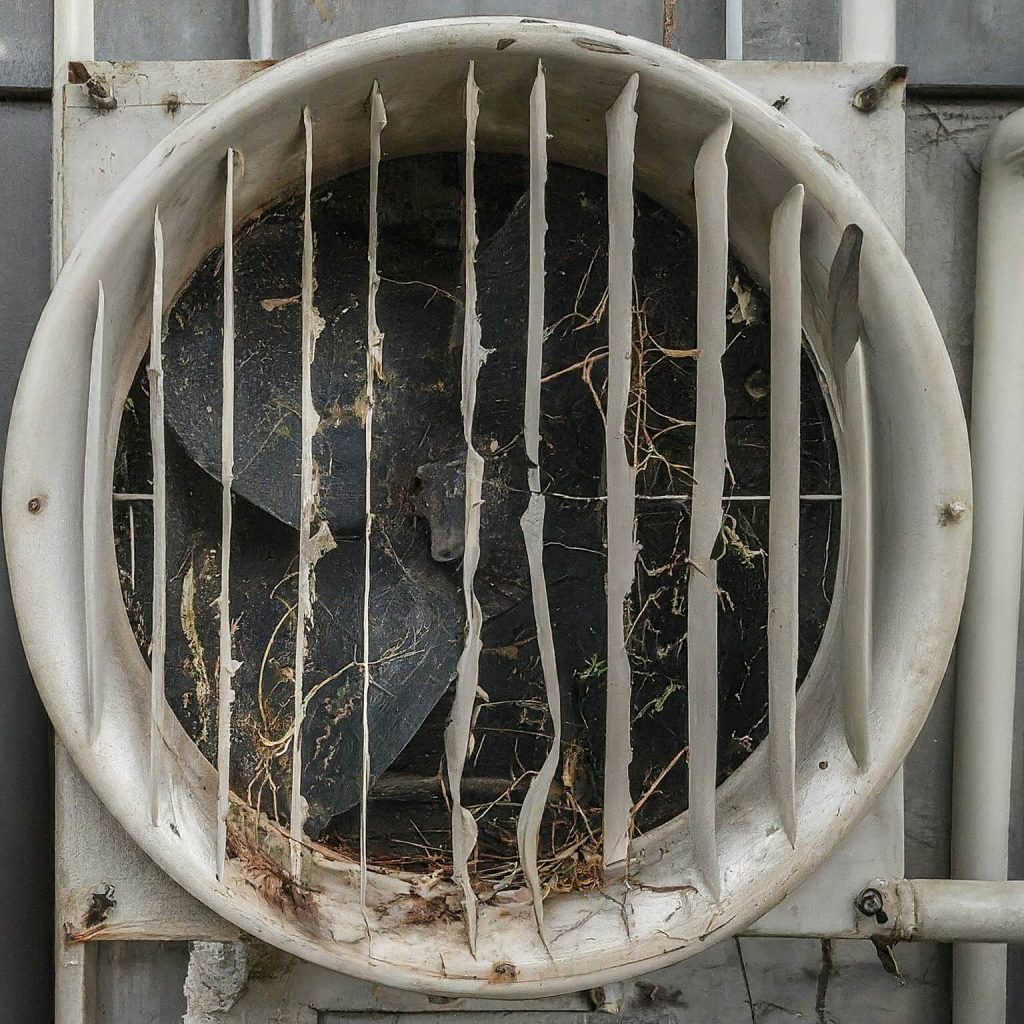
Cause: Damaged ducts can occur due to various factors, including age, wear and tear, pests, or physical damage. When ducts are damaged, they may develop cracks, holes, or loose connections, allowing cooled air to escape and creating noise as air rushes through the openings.
Effects: Damaged ducts not only contribute to increased AC noise but also reduce the cooling system’s efficiency by allowing conditioned air to escape before reaching its intended destination. This can result in uneven cooling, higher energy bills, and increased wear on the AC unit.
DIY Solution
- Inspect Ductwork: Begin by inspecting the ductwork in your home for any signs of damage, such as visible cracks, holes, or loose connections. Pay attention to areas where ducts are exposed, such as attics, basements, or crawl spaces.
- Seal Small Leaks: Use duct sealant or aluminum foil tape to seal small leaks or cracks in the ductwork. Apply the sealant or tape evenly over the damaged area, ensuring a tight seal to prevent air leakage and reduce noise.
- Patch Large Holes: To provide a more durable and secure repair for larger holes or damaged sections of ductwork, use duct mastic or metal patches. Cut a piece of metal patch material to size, apply duct mastic around the edges, and press the patch firmly into place over the hole.
- Secure Loose Connections: Tighten any loose connections or fasteners in the ductwork using appropriate tools. Ensure duct joints are adequately sealed to prevent air leakage and minimize noise.
5. Improperly Installed Ducts
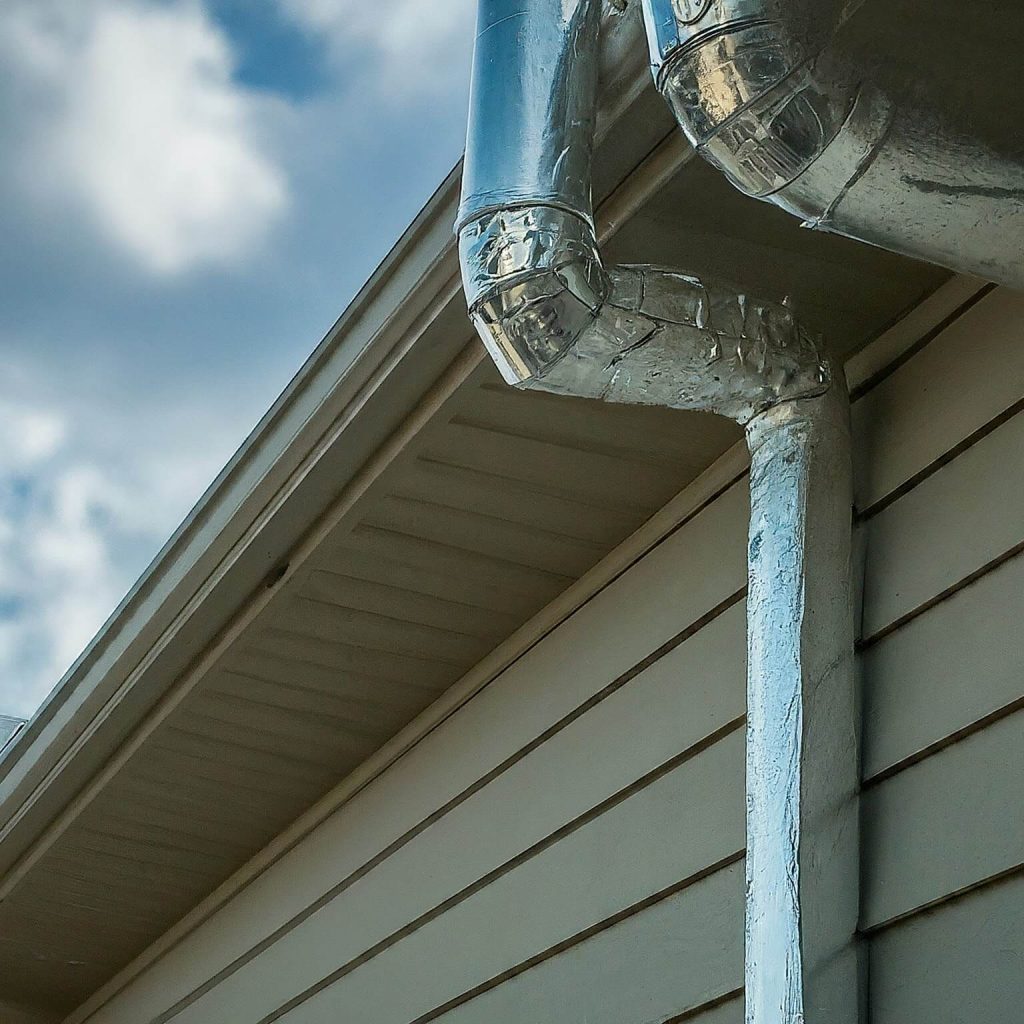
Cause: Improper ductwork installation can occur during construction or renovations, resulting in substandard connections, bends, or obstructions that impede airflow and increase noise levels. Additionally, ducts that are undersized or improperly routed can exacerbate noise issues.
Effects: Improperly installed ducts can lead to restricted airflow, increased resistance, and turbulent air movement, all of which contribute to the noisy operation of the AC system. This can result in reduced comfort, diminished cooling performance, and higher energy consumption.
DIY Solution
- Evaluate Duct Design: Assess the layout and design of the ductwork to identify any areas of concern, such as sharp bends, kinks, or obstructions that may impede airflow. Consider consulting with an HVAC professional for recommendations on improving duct design and layout.
- Optimize Duct Routing: Ensure ducts are properly sized and routed to minimize bends and obstructions. Straighten out any kinks or sharp turns in the ductwork to promote smooth airflow and reduce noise.
- Address Undersized Ducts: If your ducts are undersized for your home’s cooling load, consider upgrading to larger ducts to improve airflow and reduce noise. Consult an HVAC technician to determine the appropriate duct size and configuration for your needs.
6. Malfunctioning Compressor
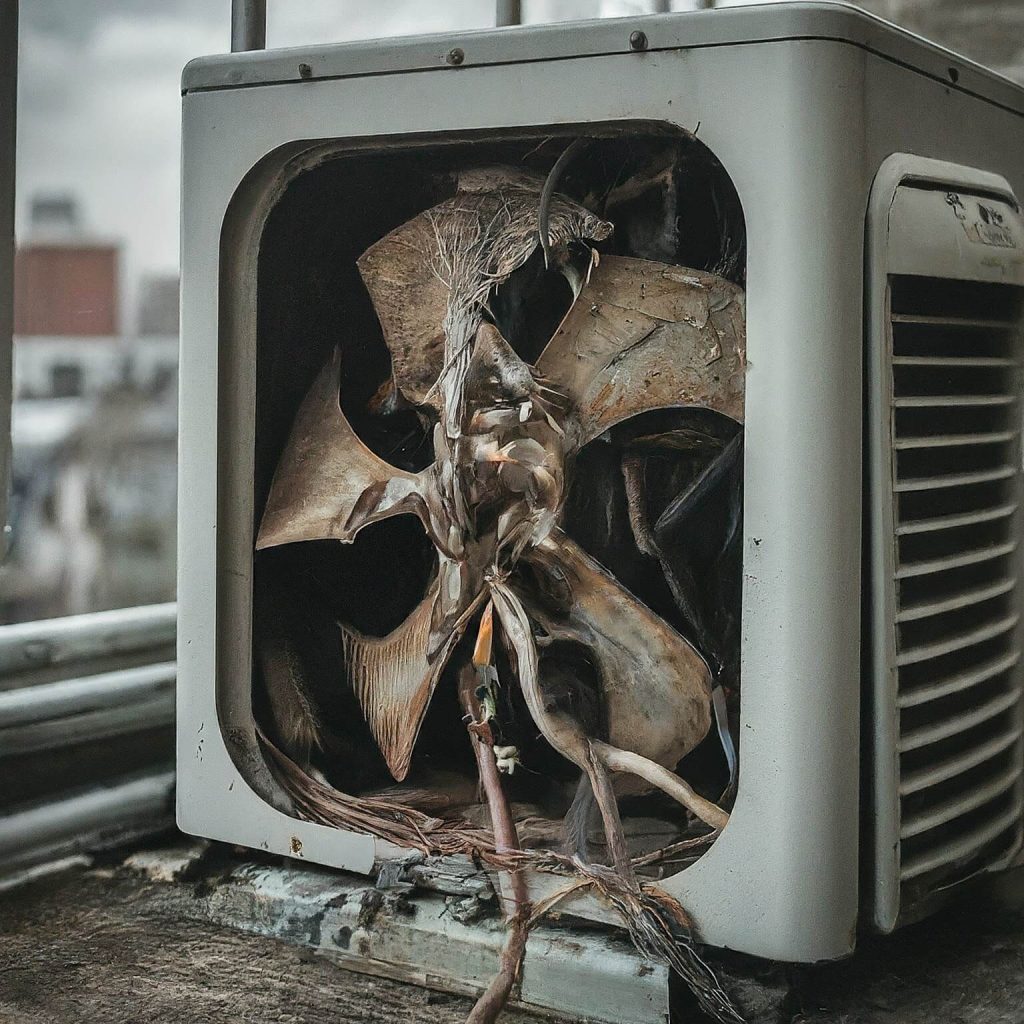
Cause: A malfunctioning compressor can occur due to various factors, including electrical issues, mechanical failure, or lack of proper maintenance. When the compressor fails to operate correctly, it may produce loud banging or clanking noises as internal components vibrate or collide.
Effects: A malfunctioning compressor not only leads to noisy operation but also disrupts the cooling process, resulting in inadequate cooling, increased energy consumption, and potential damage to other components of the AC system. Continued operation with a faulty compressor can lead to complete system failure and costly repairs.
DIY Solution
- Check Electrical Connections: Begin by checking the electrical connections to the compressor to ensure they are secure and tight. Loose or corroded connections can cause electrical arcing and contribute to noise issues. Tighten any loose connections using appropriate tools.
- Inspect for Mechanical Damage: Visually inspect the compressor for any signs of mechanical damage, such as bent or broken components, oil leaks, or excessive wear. Pay attention to the compressor housing, pistons, valves, and motor shaft.
- Listen for Unusual Sounds: Turn on the AC unit and listen for any unusual sounds from the compressor, such as banging, clanking, or grinding noises. These sounds may indicate internal mechanical issues that require further inspection and repair.
- Clean or Replace Air Filters: Clogged or dirty air filters can restrict airflow to the compressor, leading to overheating and mechanical stress. Clean or replace air filters regularly to ensure proper airflow and reduce strain on the compressor.
- Monitor Operating Conditions: Monitor the operating conditions of your AC unit, including temperature levels, airflow, and cooling performance. If you notice any sudden changes or unusual behavior, such as loud noises or reduced cooling capacity, it may indicate compressor issues that require immediate attention.
Preventative Tips To Avoid AC Making Loud Noises
A noisy air conditioner can disrupt the tranquility of your home and indicate potential issues with your cooling system. Fortunately, there are some preventative measures you can take to avoid your AC making noises. Take a look:
- Regular Maintenance: It can help identify and address potential issues before they escalate into noisy problems. Schedule annual maintenance checks with a professional HVAC technician to ensure your AC system works well.
- Clean or Replace Air Filters: Dirty or clogged air filters can restrict airflow and cause your AC to work harder, increasing noise levels. Clean or replace air filters every one to three months to maintain optimal airflow and reduce strain on your AC unit.
- Keep Outdoor Unit Clear: Ensure the area around the outdoor unit of your AC is free from debris, such as leaves, twigs, and branches. Regularly inspect and remove any obstructions to prevent airflow blockages and minimize noise from the outdoor unit.
- Tighten Loose Components: Periodically check for loose screws, bolts, or fasteners on your AC unit, including fan blades and access panels. Tighten any loose components to prevent rattling or vibrating noises during operation.
- Lubricate Moving Parts: Lubricate moving parts of your AC system, such as fan motors and bearings, to reduce friction and minimize noise. Follow manufacturer recommendations for lubrication intervals and use appropriate lubricants for your specific AC model.
- Monitor Refrigerant Levels: Monitor refrigerant levels in your AC system to ensure they are within the recommended range. Low refrigerant levels can indicate a leak, leading to hissing or bubbling noises. If you suspect a refrigerant leak, contact a technician for inspection and repair.
- Install Sound-Dampening Materials: Consider installing sound-dampening materials, such as acoustic panels or vibration pads, near your AC unit to reduce noise transmission. These materials can help absorb sound and minimize vibrations, creating a quieter indoor environment.
Home Warranty Solutions To Silence The AC Noise
Dealing with a noisy air conditioner can be frustrating and disruptive, but with the right home warranty solutions, you can silence the AC noise and enjoy a peaceful indoor environment. In this section, let’s explore home warranty for AC units that can provide comprehensive coverage and help you address noisy AC issues effectively and affordably.
|
Company |
Plans With AC coverage |
Covered Parts |
Exclusions |
Maximum Coverage |
Service Call Fee |
|
|
Elite Systems & Elite Complete Plans |
All components of ACs up to 5 tons |
NA |
Up to $5,000 (AC with ductwork) |
$70 & $150 (on weekends/after hours) |
||
|
ShieldSilver, ShiledGold, ShieldPlatinum Plans |
All components of ACs up to 5 tons |
Underground piping, components of geothermal or water source heat pump, window units, chiller, and its components, and water lines |
Up to $5000 per contract term |
$100 & $125 |
||
|
Platinum Plan |
All components of ACs up to 5 tons units below 13 SEER and/or R-22 equipment (only residential units) |
Filter driers, condenser casings, registers, water towers, humidifiers; chillers, electronic air cleaners, window units, gas air conditioning systems, water evaporative coolers, condensate pumps, exterior condensing, cooling pads, roof mounts, electronic, computerized, or manual systems |
Up to $1,500 per contract item |
$75 |
||
|
Total Plan |
All components and parts of ducted, central, electric, split, and package AC units |
Portable units, fuel storage tanks, chimneys, water lines, chillers, insulation, labor fares, etc. |
Up to $3,000 per contract term |
$75 – $125 |
||
|
Systems Guard and Total Home Guard Plans |
Electrical AC units up to 5-ton capacity |
Shorted or grounded compressors, condenser casings, registers, electric air cleaners, water towers, humidifiers, chillers, exterior condensing, coils, etc. |
Up to $2,000 |
$90 |
Why Should You Have A Home Warranty For Your AC?
We have listed the 5 top reasons you can consider having a home warranty to protect your air conditioning systems.
1. Comprehensive Coverage for AC Repairs
- Home warranty plans typically cover repairs for essential home systems and appliances, including air conditioning units.
- If your AC is making loud noises, you can contact your home warranty provider to request a service call from a qualified technician.
- The technician will diagnose the issue and perform necessary repairs to address the noisy AC, restoring your cooling system to quiet and efficient operation.
2. Replacement of Noisy AC Components
- In some cases, noisy AC issues may require the replacement of components such as fan motors, bearings, or compressor units.
- With a home warranty plan, you can receive coverage for replacing these components, minimizing out-of-pocket repair expenses.
3. Emergency Repair Services
- Loud AC noises can indicate underlying issues that need immediate attention to prevent further damage to your cooling system.
- Home warranty plans often include emergency repair services, allowing you to request urgent assistance for noisy AC problems outside regular business hours.
4. Access to Qualified Service Providers
- Home warranty companies partner with a network of licensed and vetted service providers to ensure high-quality repairs and replacements.
- When you file a claim for a noisy AC, your home warranty provider will dispatch a skilled technician with experience in diagnosing and resolving AC issues.
5. Peace of Mind with Extended Coverage
- Home warranty plans typically offer extended coverage beyond the manufacturer’s warranty, providing added peace of mind for homeowners.
- With a home warranty, you can rest assured knowing that your AC is protected against unexpected breakdowns and noisy operation.
Instead of facing expensive AC repair bills or replacement costs, you can rely on your home warranty to cover eligible repairs and replacements, helping you save money in the long run.
Conclusion
A noisy air conditioner can be a nuisance, but you can enjoy a quieter indoor environment by understanding the potential causes and implementing the appropriate solutions. Taking proactive steps to maintain your AC system will reduce noise, extend its lifespan, and improve efficiency.
If you need help diagnosing or repairing a noisy AC, seek professional assistance or contact your home warranty provider. Proper care and maintenance allow you to keep your AC running smoothly and quietly for years.
Frequently Asked Questions (FAQs)
Why Is My Air Conditioner So Loud Inside?
A.
Possible reasons include dirty or clogged air filters, loose or worn fan blades, malfunctioning compressor or motor, or issues with ductwork. Cleaning or replacing filters, tightening loose components, and scheduling maintenance can help reduce indoor AC noise.
Why Does My Ac Make A Loud Noise When It Turns Off?
A.
This could be due to a phenomenon called “banging pipes” caused by sudden pressure changes in the refrigerant lines as the compressor shuts off. It could also indicate a faulty compressor or motor mount. Consulting a technician can help diagnose and fix the issue.
Why Is My Air Conditioner Humming But Not Running?
A.
A humming noise without the AC running could be due to an electrical issue, such as a faulty capacitor, contactor, or relay switch. It could also indicate a problem with the fan motor or compressor. It is recommended that you consult a professional HVAC technician for inspection and repairs.
related articles
 Discover First American Home Warranty Locations and What You Need to Know About Their Cover.
Discover First American Home Warranty Locations and What You Need to Know About Their Cover.
 Reviews of Home Warranty Companies Show You How to Determine If Your Home Is Covered
Reviews of Home Warranty Companies Show You How to Determine If Your Home Is Covered











